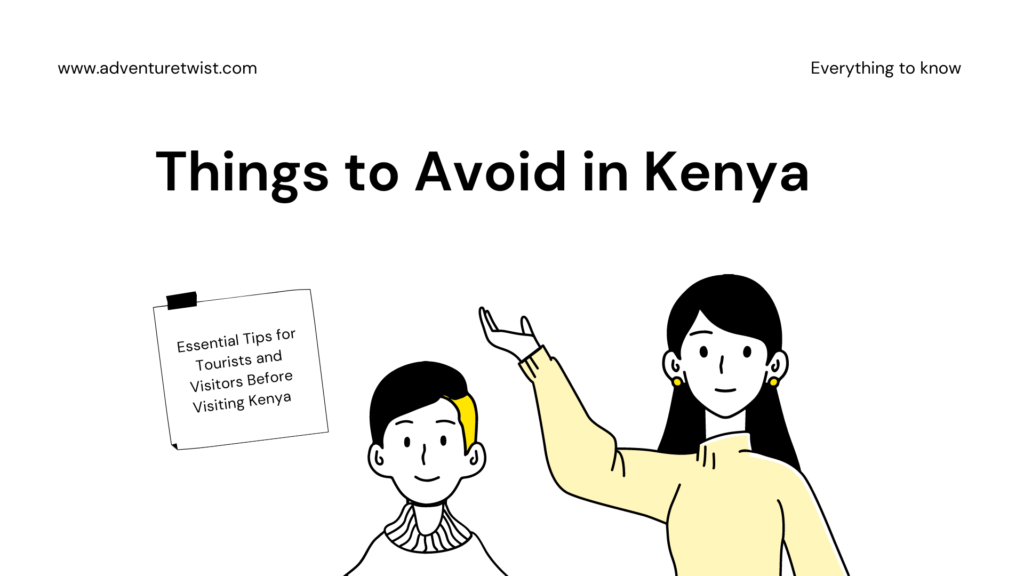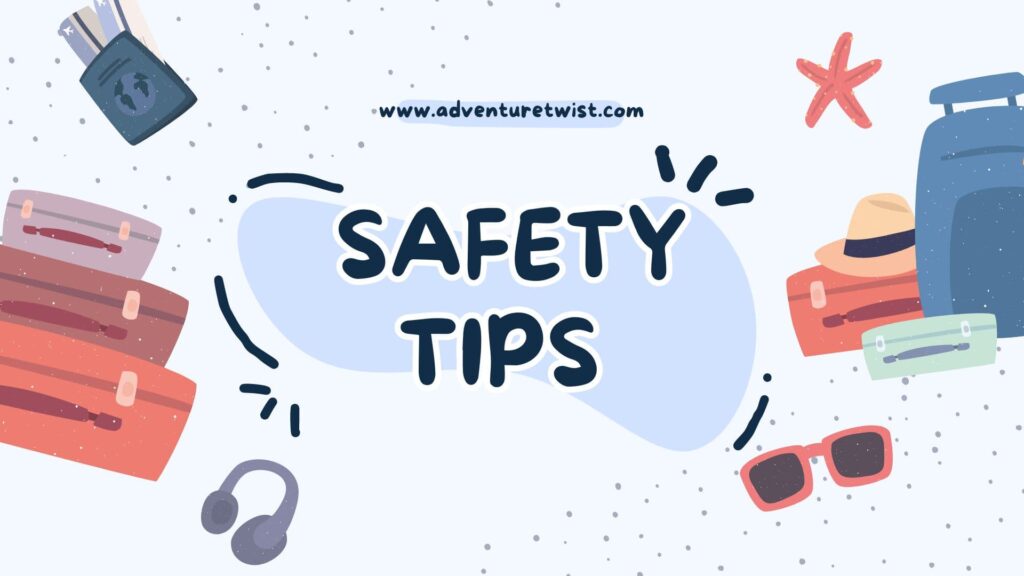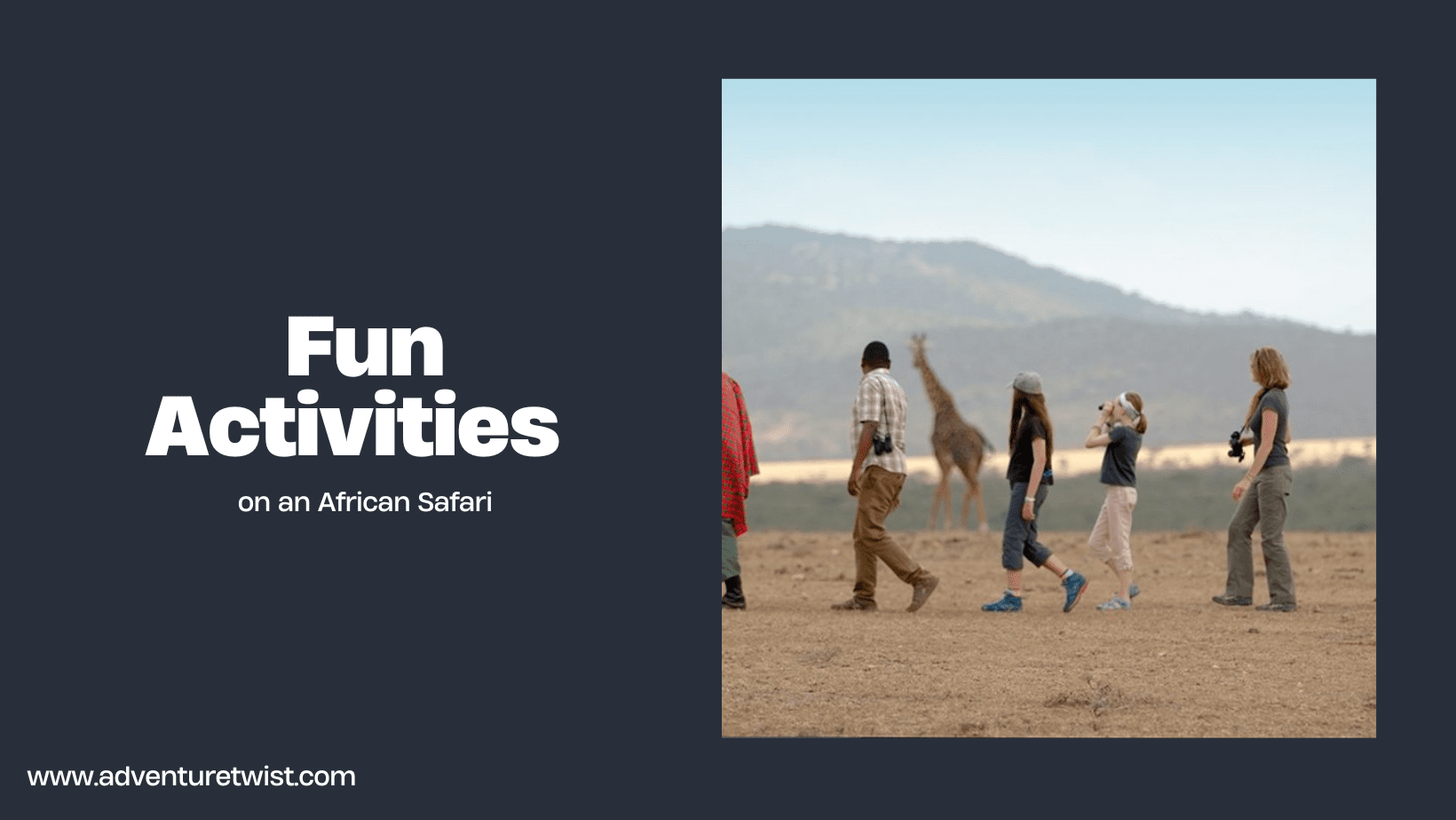
Part of what people look for when visiting a country for vacation or tourism is fun and interesting activities. While it is enjoyable to consider these options, it is also important to keep in mind the things to avoid, as you are in a place that isn’t your home. Whether it is your first time in Kenya, or you have been here before, it is essential to know this list of things to avoid. Many travelers wish they had known these things before visiting but you don’t need to worry, as some of this information will be useful even when you visit other countries for the first time.
Legal Things to Avoid in Kenya as a Tourist or Visitor
Avoid Bringing a Drone to Kenya
It’s always good to be aware of the dos of a location, but it’s equally important to know the don’ts. One thing to avoid in Kenya as a tourist or foreigner is the use of drones. Don’t try to bring one into the country (It might be confiscated by the TSA if found), and if you manage to do so, it is advisable not to fly it, especially in Nairobi. It’s important to know that drones are illegal in Kenya, particularly for foreigners. You can read more on the legal resources about drone laws in Kenya via the Kenya Civil Aviation Authority (KCAA).
Avoid Photos in Nairobi City Centre
As foreigners, one of the things to avoid in Kenya is taking photos, especially in Nairobi’s City Centre. It is frowned upon to pull out a camera and start shooting in this area. If the police see you, there’s a good chance they might ask for money and tell you that you need a permit. So, it’s best to just avoid it.
Now, getting this permit isn’t straightforward. I mean, you can research it online, and if you were filming a movie, it’s probably required. But realistically, if you want to take photos in downtown Nairobi (which is understandable) because it’s an incredible and photogenic cityscape, you’ll likely have to go to the police station and pay the police to accompany you while you take photos. They’ll walk around with you for a couple of hours, depending on how they’re feeling and how much you pay them, allowing you to shoot without any disturbances. However, without this arrangement, you could be fined for taking photos downtown.
Public Smoking Prohibited: Key Areas to Avoid
Smoking is highly controlled in Kenya and travelers need to take note of this. Although cigarettes are not banned, there are designated smoking areas within the city for smokers. The Tobacco Control Act, of 2007, is the main law regulating tobacco control in the country and this includes restrictions on tobacco promotion, advertising, and public smoking, among others. For information on health and safety guidelines, including COVID-19 travel restrictions, you can visit Kenya’s Ministry of Health.
Anyone caught smoking in public is liable to a fine of fifty thousand shillings (50,000 ksh) or sentenced to a six-month jail term. The five designated smoking zones include Uhuru Park, Jevanjee Gardens, Latema Road, GPO, and Bus Station. Ensure you are in one of these zones if you must pop that spark.
Safety Tips: What Not to Do in Kenya

Beware of Drunk Drivers
Drunk drivers are one of the major causes of accidents in the country especially in Nairobi city. It is a regular occurrence to encounter drunkards and drunk driving as you go about your day but more during the night.
It is so bad that the police conduct frequent checks at different points throughout the city to monitor the alcohol consumption of drivers. Using a small test meter inserted in the driver’s mouth, they can ascertain if the driver is clear and immediately arrest any driver under the influence of alcohol.
Alcohol is also regulated in Kenya and local stores are not allowed to sell after seven (7 pm). However, there are a few licensed 24hrs liquor stores in the city.
Be Bold
There is a popular phrase for travelers visiting a place for the first time, which is ‘Don’t be afraid, but don’t be stupid.’ In Kenya, if you’re in the city centre, don’t have your phone out taking a bunch of selfies, especially if you’re on the back of a boda boda (these are bicycles and motorcycle taxis commonly found in East Africa). This is considered one of the common mistakes foreigners make. Just don’t do that. Or if you do, be aware that there is a strong possibility that somebody may at least attempt to snatch your phone. But don’t be afraid to go downtown.
Do not take Staring Personally
Most people wouldn’t consider this as part of the things to avoid in Kenya, but it’s important to know that people will stare at you, especially because you are a foreigner. This is normal, and you’ll find it happens in other countries as well. Therefore, you should not take the staring personally.
Be rest assured that Kenyans aren’t staring at you because there’s something wrong with you; it is most likely because you are unique. It’s a different visual stimulation, and when we see things that are different from our norm, we tend to look. It is easy to get offended by this, but understanding the reason for the stares should influence your reaction.
You can visit Kenya’s Official Tourism Website. This site offers comprehensive information for tourists, including safety tips and cultural advice.
Cultural Norms and Things to Avoid in Kenya
Avoiding Staying in Your Comfort Zone
If you’re coming from the Western world or the Eastern world, like Asia, it’s always advisable not to stay in your comfort zone when you travel to Kenya. The reason is that Kenya has a lot of interesting and amazing places to visit and create memories. But this won’t be achievable if you stay in your comfort zone and avoid going out to have fun. You need to have a wholesome experience in Kenya. The people are incredible (the majority), and so is their cuisine.
Use M-Pesa in Kenya
M-Pesa is an electronic payment system that you use through your SIM card and Kenyan phone number. So, if you’re going to be in Kenya for any amount of time and don’t have cash or don’t want to withdraw a lot of it, you can use M-Pesa. You can have the application installed on your phone (iOS or Android). Almost everyone in Kenya accepts M-Pesa, even small shops, and you can use it to send money to your friends. It is swift and all-encompassing.
Don’t Miss the Safari
Kenya is one of the hottest safari destinations in Africa and there are a lot of options within the country for this once-in-a-lifetime experience. You can check out the Masai Mara, a very popular one on the west side of Kenya, or Amboseli, located at the base of Mount Kilimanjaro on the Kenyan side. There are also options up north. There are all sorts of safaris to choose from, but don’t miss the chance to go on one while you’re there. They are reasonably priced and promise to be worth your while.
Get your E-Visa (Kenya eTA)
As of January 1st, 2024, visitors will require an Electronic Travel Authorization to visit Kenya. The eTA application should be done through the official website. We have put together everything you need to know about the Kenya eTA requirements and how to apply for it. To check this out, you can click on the link below.
Recommended: Kenyan eTA Requirements and Application Guide for 2024
Visit the Markets
You can’t visit Kenya without experiencing the local markets to get a feel of what they’re like. However, this may push you out of your comfort zone. When you go to the market, people may only speak Swahili, and interacting might feel a bit uncomfortable, but these experiences can be once-in-a-lifetime. I don’t know how many times you’ll visit Africa, but the market experience is priceless. Speaking with the local people and engaging with the local culture is incredible. This is a big part of travel.
Just be mindful of what you buy there, as your stomach might not be accustomed to some of the bacteria on the food, or some items might not be clean. It’s preferable to stick to fruits, vegetables, and things you can clean yourself.
Note: It’s important to know that this list was not put together to make you fear Kenya or discourage you from traveling there. They are simply an educational guide to help you be aware of what to look out for and what to avoid so that you can enjoy your trip a little bit more.
Enjoy your travels to Kenya!



0 Comments